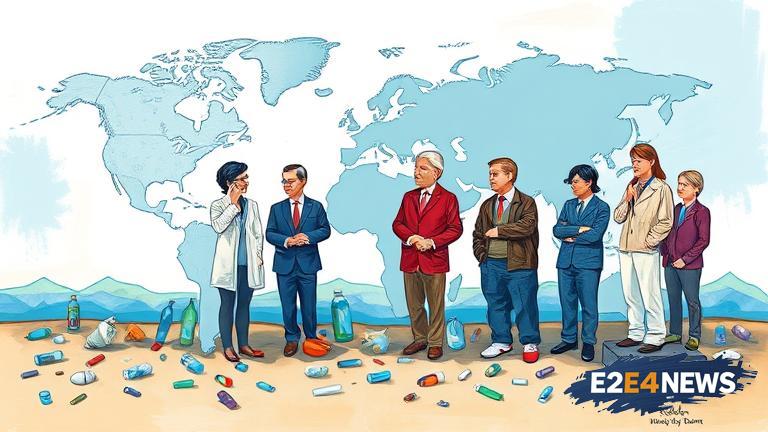The plastic pollution crisis has become a major concern globally, with millions of tons of plastic waste entering the environment every year. In response, leaders from around the world are being urged to deliver a bold and ambitious global plastics treaty. This treaty would aim to reduce plastic pollution, increase recycling rates, and promote sustainable practices. The call for a global plastics treaty comes as the world struggles to cope with the devastating impact of plastic pollution on the environment, wildlife, and human health. Plastic pollution has been linked to a range of problems, including climate change, ocean pollution, and the decline of biodiversity. The production and disposal of plastic products are also major contributors to greenhouse gas emissions, which are driving global warming. Despite the growing awareness of the plastic pollution crisis, the problem continues to worsen, with plastic production expected to quadruple by 2050. The need for a global plastics treaty has never been more pressing, and leaders are being urged to take bold and ambitious action to address the crisis. The treaty would need to be comprehensive, covering all aspects of the plastic lifecycle, from production to disposal. It would also need to be legally binding, with clear targets and timelines for reducing plastic pollution. The development of a global plastics treaty would require international cooperation and agreement, with all countries working together to address the crisis. This would involve sharing knowledge, expertise, and best practices, as well as providing financial and technical support to countries that need it. The treaty would also need to involve all stakeholders, including governments, businesses, and civil society organizations. By working together, it is possible to create a global plastics treaty that is effective, equitable, and sustainable. The benefits of a global plastics treaty would be numerous, including reducing plastic pollution, promoting sustainable practices, and protecting the environment and human health. It would also help to support economic development, by creating new jobs and opportunities in the recycling and sustainability sectors. Furthermore, a global plastics treaty would help to address the issue of plastic pollution in oceans, which is a major concern for many countries. The treaty would need to include measures to reduce marine litter, protect marine ecosystems, and promote sustainable fishing practices. In addition, it would need to address the issue of microplastics, which are a major contributor to plastic pollution. The development of a global plastics treaty would be a complex and challenging process, but it is essential for addressing the plastic pollution crisis. It would require strong leadership, international cooperation, and a commitment to creating a more sustainable and equitable future. The call for a global plastics treaty is being led by a range of organizations, including the United Nations, the European Union, and the World Wildlife Fund. These organizations are working together to raise awareness of the plastic pollution crisis and to promote the development of a global plastics treaty. They are also working with governments, businesses, and civil society organizations to build support for the treaty and to ensure that it is effective and equitable. Overall, the need for a global plastics treaty has never been more pressing, and leaders are being urged to take bold and ambitious action to address the crisis. By working together, it is possible to create a treaty that is comprehensive, legally binding, and effective in reducing plastic pollution and promoting sustainable practices.





